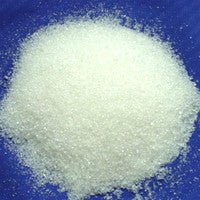CITRIC ACID ANHYDROUS
Technical Grade
Cosmetic Grade
Citric acid is a weak organic acid but is a slightly stronger acid than typical carboxylic acids. This is because the anion can be stabilized by intermolecular hydrogen-bonding from other protic groups on Citric Acid. Anhydrous means that the chemical has no water of crystallisation and is in a dry, granulated, free-flowing form. It is easily soluble in water and ethanol, but is insoluble in ether and chloroform.
Properties of citric acid anhydrous:
- CAS number: 77-92-9
- Appearance: white solid
- Formula: C6H8O7
- Density: 1.665 g/cm3
- Solubility in water: 133 g/100 ml (20C)
- Melting point: 153-154C
- Autoignition temperature: 1010C
- Explosion Limits: Lower:28 Upper: 2.29
PLEASE NOTE: This product is not for human or animal consumption.
Uses for Citric acid Anhydrous
- Citric acid's ability to chelate metals makes it useful in soaps and laundry detergents. By chelating the metals in hard water, it lets these cleaners produce foam and work better without need for water softening. In a similar manner, citric acid is used to regenerate the ion exchange materials used in water softeners by stripping off the accumulated metal ions as citrate complexes.
- Citric acid is the active ingredient in some bathroom and kitchen cleaning solutions. A solution with a 6% concentration of citric acid will remove hard water stains from glass without scrubbing. In industry it is used to dissolve rust from steel.
- Citric acid is also used as a stop bath in photography. The developer is normally alkaline, so a mild acid will neutralize it, increasing the effectiveness of the stop bath when compared to plain water.
- Citric Acid is used to regenerate the ion exchange materials used in water softeners by stripping off the accumulated metal ions as citrate complexes.
- When applied to hair, citric acid opens up the outer layer, also known as the cuticle. While the cuticle is open, it allows for a deeper penetration into the hair shaft. It can be used in shampoo to wash out wax and colouring from the hair.
- It is used in conjunction with sodium bicarbonate to make 'Bath bombs' which react together and fizz when placed in water.
Health & Safety
Risk Phrases: R 36/37/38 Irritating to eyes, respiratory system and skin.
Safety Phrases: S 26 In case of contact with eyes, rinse immediately with plenty of water and seek medical advice. S 37/39 Wear suitable gloves and eye/face protection.
